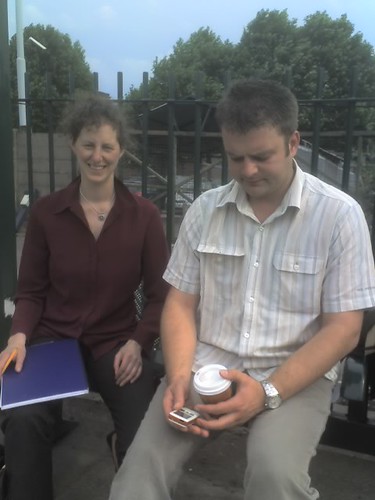An excellent workshop with presentations from David Squire (DESQ), West Notts College Key Skills, and the Nottingham LEA e:Games project. None of them HE by the way! Telling.
The fundamental question was the same question we will ask at the HE Academy Conference: Are digital games valuable to higher education and if so what would they look like? Here are a few notes:
David Squire sessionRules of play and game design principlesSee book of that title by Zimmerman
Games need rules, tension, user agency/control, competition and reward. (Not convinced about the 'competition', but maybe that is what distinguishes games from just interactive approaches such as simulation.
Games create engagement, immersion, flow, intrinsic motivation.
JP Gee describes games as being 'pleasantly frustrating.'
'Discovery games may be a useful approach for HE, but how do 'open ended' games fit alongside learning outcomes? And the setting and checking of session objectives?Life StylesDiscussion about neomillennial learners who multi-multi-task in digital environments (MySpace, mobile, homework, radio, etc) Limited attention spans and need for autonomy.
Do 'games' belong to education (HE) - should we expect students to accept us entering a domain that they own. (Similar to use wanting to use the student's mobiles for learning). Or... do/will students expect us to use those media?
I wondered how limited, multi-tasking attention spans tally with the huge demand games require. They are (should be) intensely 'motivating'.
The idea of students having control of their learning experience is an interest thought. Arguably students expect to be able to control their learning and if we are not accommodating this then we are not accommodating our students. Many games support learner autonomy.
So 'games' present questions that align with other thoughts we are addressing (learning spaces, autonomy, etc).
David Squire proposed the following categories for games that may be useful in learning:
1. Edutainment - (home + school)
2. COTS (Commercial off the Shelf) - we have dismissed this in our work as not be a generally useful approach in HE, though the classic example of Civilisation being used in history classes was cited again.
3. Mod-ing - editing existing games with relevant content and contexts. This needs to be explored more by us as it may go some way to addressing the issue of 'economies of scale' that is an obstacle to HE.
4. Constructing - making your own (or just learning by making your own). Yes, mileage here and we are using this technique in our on-going inter-professional approach. But I also thought we could offer paper-based game design as a power 'learning by doing' approach.
5. Edu-games - games that are made specifically for education by games developers. Again this may be an economies of scale question for HE though I can see potential in subjects that use a very similar curriculum (eg Medicine). Blend/merge/mix learning and play. Interlock.
Never Winter Nights sessionWest Notts College
The was really useful. They demonstrated how they had mod-ed 'Never Winter Nights' produce a sophisticated 3D game that supported assessment. However, it required a lot of 'beyond the call of duty' type time!!!! Still, we should definitely (re)proove the concept as I believe game mod-ing could be a powerful solution for HE. More info here:
http://www.alteredlearning.com/Licencing? Because the game is not based on the current version licences are very cheap.
Accessibility? takes non-gamers about 20-30 minutes to pick up techniques. Voice over text responses.
Level progression is gated by passwords revealed through successful activities.
Save game state function so students could come back (and tutors could demo).
Note on game design: too many options away from the intended path is a very bad idea. There's a need to balance distractors.
The mod-ng process required skills similar to C. Graphics could be dragged into the environment.
Resistance to take up? Staff yes - some. Students? No, just one or two out of 7-800 students using it.
The team ran tutor awareness sessions and tutor guides to deal with common 'I don't know how to play computer games' responses.
(How) did the enthusiasts convince the college? A lot of enthusiasm was needed to kick start and proove concept. Then convinced Senior management, especially when they won a Beacon Award.
Note on the culture change challenge: staff are having to learn about new technologies (games) and about new pedagogies. Multiply that for each member of teaching staff and this represents the challenge to an educational organisation I think.
e:GamesNottinghamA project run by Nottingham LEA and now going national to engae disaffected young people with education.
A totally different approach of using games to attract people to an educational environment. The project has established a game league. Students form teams or clans and play different games aginst other teams to progress up league. They are awarded points for completing and for team skills.
The whole purpose is to develop team skills, communication skills, ICT skills, etc.
The League supported by a website where teams have a presence.
See
www.egames-uk.netOther notes from discussion:
More than one student playing a game at same machine: "They'll be talking." Hence peer support, complimentary skills, etc
Hardware specs for HE are never going to be equivalent to specs required by state of the art commercial games.
My ' media interventions' concept: yes, games fit in with this idea of creating short, high impact focal points.
